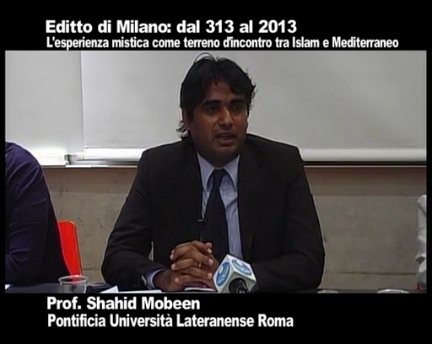Similarly Fr.Francesco Giordano teaches this semester that being saved in invincible ignorance (LG 16) is an exception to extra ecclesiam nulla salus and so every does not need to formally enter the Church, for example in Rome, for salvation.There is salvation outside the Church. So there is a change in dogma and doctrine for him. Doctrine has developed.He accepts Marchettiism and Cushingism and rejects Feeneyism like the liberals and the Left.
A development of doctrine. This is the name of a course in theology at the University of St.Thomas Aquinas ( Angelicum), Rome.It is called The Nature of Revelation and the Development of Doctrine.
The dogma on salvation has changed and now there are new doctrines expressed in a new ecclesiology. All this was possible by assumeing invisible for us cases are visible in the present times.They did it with the inference. They first assumed there are known cases in the present times of people saved without the baptism of water in the Catholic Church then after presuming that these invisible cases were visible, they inferred that these cases were visible exceptions to all needing to enter the Church for salvation.Even though these persons are hypothetical and abstract for us it was inferred that they were concrete and known.This is all irrational. Yet this is the basis for the theology of these professors.
I keep writing this same thing every year and they do not nothing about it. While the traditionalists and sedevacantists do not know what is happening still. They use the same irrationality, the same theology to interpret Vatican Council II. However unlike these professors they reject Vatican Council II while the Angelicum accepts Vatican Council II interpreted with the irrational inference.
I keep writing this same thing every year and they do not nothing about it. While the traditionalists and sedevacantists do not know what is happening still. They use the same irrationality, the same theology to interpret Vatican Council II. However unlike these professors they reject Vatican Council II while the Angelicum accepts Vatican Council II interpreted with the irrational inference.
So in this course on the development of doctrine and dogma the bibliography includes a book by J.Hick on the new theology. According to this 'Christian' theology of Religions, other religions are also paths to salvation.This is a new doctrine which became possible with explict for us LG 16, LG 8 etc.This course is taught by Fr.Bernard Blankenhorn O.P one of the many new,young Dominican priests who have accepted the new irrational theology.It contradicts Vatican Council II (AG 7,LG 14) which says all need faith and baptism for salvation. Hindus, Buddhists,Jews, Muslims and pagans do not have faith and baptism.While Protestants and other Christians do not have Catholic Faith which includes the the Sacraments and the faith and moral teachings of the Church necessary to avoid mortal sin and preserve Sanctifying Grace.
-Lionel Andrades
PRIMO SEMESTRE – FIRST SEMESTER CORSI - COURSES 2015-2016
dP 1881 Fundamental Theology: The Nature of Revelation & the Development of Doctrine 3 ECTS
This course studies some key themes in fundamental theology from a Thomistic perspective, including (1) post-modern critiques of revelation, (2) the nature of revelation, especially the function of history and propositional revelation, and (3) the development of doctrine, with a focus on moral doctrine.
BIBLIOGRAPHY:
THOMAS AQUINAS, Summa Theologiae I, questions 1, 12-13, 43; II-II, questions 1-2; III, questions 36, 42-43, 55; M. CANO, De locis theologicis, Madrid: BAC, 2006; SECONDO CICLO - SECOND CYCLE 65 J. HICK, A Christian Theology of Religions: The Rainbow of Faiths. Louisville, Kentucky: Westminster John Knox Press, 1995; M. LEVERING, Engaging the Doctrine of Revelation, Grand Rapids, Michigan: Baker Academic Press, 2014; J. T. NOONAN, A Church That Can and Cannot Change, South Bend: Univ. of Notre Dame Press, 2005 B. BLANKENHORN, O.P. Thu. 15.30-17.15
http://www.pust.it/attachments/article/32/Ordine%20Degli%20Studi%20A.A.%202015-2016.pdf
 FR. BERNHARD BLANKENHORN, O.P.
Fr. Bernhard Blankenhorn is professor of theology at the Pontifical University of St. Thomas (Angelicum) in Rome. He earned a B.A. majoring in political science from the California State Polytechnic University in Pomona in 1997. He also has an M.A. in philosophy and an M.A. and M.Div. in theology. He completed his doctorate in theology at the University of Fribourg in Switzerland in 2012, under the direction of Fr. Gilles Emery, O.P. His dissertation is "Dionysian Mysticism in the Early Albertus Magnus and in Thomas Aquinas."
|






